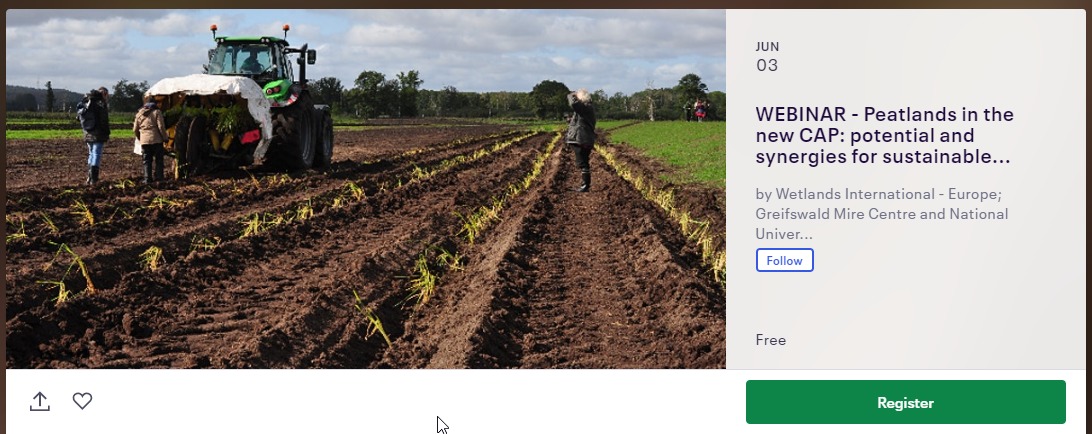
WEBINAR – Peatlands in the new CAP: potential and synergies for sustainable regional economies with climate and biodiversity benefits
Peatlands occur in all EU Member States (except Malta), often covering more than 10% of the total land area. Fully functional, healthy wet peatlands are the most effective long-term carbon store and sink on the planet.
Drainage of peatlands leads to the breakdown of stored carbon and consequently to emission of substantial levels of CO2. The EU is globally the second largest emitter of greenhouse gases (GHGs) from drained peatlands (220 Mt CO2eq/year). This is equivalent to circa 5% of the total EU GHG emissions. The largest peatland emitters from agricultural land in the EU are Latvia, Estonia, Finland, Lithuania, Romania, Poland, Sweden, Germany, Netherlands, Ireland and Denmark. In all of these countries, drained peatlands contribute to more than 25% of total emissions from agriculture.
The negative environmental effects of peatland drainage can be significantly reduced by raising water levels. This requires a paradigm shift in agriculture and forestry on peatlands: In contrast to drainage-based land use, paludiculture cultivates crops that are adapted to high water levels, such as reed, cattail, black alder and peat mosses. Large-scale implementation of paludiculture requires agricultural policies to set explicit incentives to ensure that it becomes advantageous for landowners to rewet drained agricultural peatlands and subsequently to maintain them as wetlands optimising retention of GHGs. Carbon farming is also an option that requires consideration in the new EU CAP.
In the long term, a complete cessation of peatland drainage is unavoidable if we want to reach the core goal of the Paris Agreement – zero net CO2 emissions by 2050.
This event will present the science base behind peatlands at EU level, show examples of farming on peatlands, inform about practical and political solutions and how these could be integrated into the new CAP.
This webinar is organised by Wetlands International Europe, Greifswald Mire Centre and the National University of Ireland, Galway
Background policy brief “PEATLANDS IN THE EU’S COMMON AGRICULTURE POLICY (CAP) AFTER 2020”: [Download not found]
Draft Agenda:
13.00 – 13.05 Introduction – Jan Peters
13.05 – 13.20 First round of presentations
- Farmer on drained peatland not satisfied & explaining peculiarities (Tommy Earley*, Ireland)
- Scientist explaining carbon footprint of dairy products in Europe (Wiktor Kotowski, Poland)
- Rewetting practitioner explaining how it is done and what it costs/benefits (NN, Scotland)
- Farmer who has shifted to paludiculture and explains the product (Aldert van Weeren*, NL)
- Scientists explaining ecosystem services of rewetted peatlands, in particular the climate benefits and how they are measured and assessed (Anke Günther* & Franziska Tanneberger*, Germany)
13.20 – 13.35 Questions and answers
13.35 – 13.45 Second round presentations
Statements from:
- MEP Peter Jahr
- MEP Grace O’Sulivan
- MEP Anja Hazekamp
- MEP Norbert Lins
- MEP Mairead McGuinness
Policy recommendations by Niall Ó Brolcháin
13.45 – 13.55 Questions and answers
13.55 – 14.00 Wrap up
To register visit our event page here
No time to connect or trouble in connecting?
- Watch the full livestream on our Youtube channel: https://youtu.be/U6yt1QBTlcs







